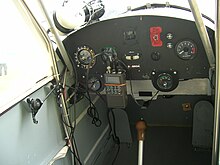Fisher FP-202 Koala
| FP-202 Koala & Super Koala | |
|---|---|

| |
| FP-202 Koala | |
| Role | Kit aircraft |
| National origin | Canada |
| Manufacturer | Fisher Flying Products |
| First flight | FP-202: 1981 Super Koala: 1982 |
| Number built | FP-202: 330 (2011)[1] Super Koala: 105 (2011)[1] |
| Developed from | Piper J-3 |

The Fisher FP-202 Koala and Super Koala are a family of Canadian single and two seat high wing, conventional landing gear, single engined light kit aircraft designed for construction by amateur builders. Both aircraft were inspired by the design of the Piper J-3 Cub and strongly resemble that design.[1][2][3][4][5][6][7]
Fisher Flying Products was originally based in Edgeley, North Dakota, USA but the company is now located in Woodbridge, Ontario, Canada.[2][3][4][5][6][7]
Development
The FP-202 was designed by Fisher Aircraft in the United States in 1981 and was intended to meet the requirements of the US FAR 103 Ultralight Vehicles category, including that category's maximum 254 lb (115 kg) empty weight. The design goal was to provide ultralight pilots with an aircraft that looked like and flew like the classic Piper Cub, without the regulation that goes with owning a type certified aircraft. The FP-202 can achieve an empty weight of 250 lb (113 kg) when equipped with a lightweight, two-stroke engine.[3][5][6]
The Super Koala was first flown in 1983 and has two side by side seats arrangement. With its 400 lb (181 kg) empty weight and 830 lb (376 kg) maximum gross weight, the Super Koala was intended for the US Homebuilt aircraft category.[3][5][7]
The construction of the FP-202 and Super Koala are unusual for aircraft in their class. The aircraft's structure is entirely made from wood, with the wooden fuselage built from wood strips arranged in a geodesic form, resulting in a very strong and light aircraft with redundant load paths. Like the Cub, both the wings and fuselage on the Koalas are covered with doped aircraft fabric. The wings are strut-braced and utilize jury struts. The landing gear is bungee suspended and the tail wheel is steerable. The Super Koala has flaps and brakes are optional on both designs. The company claims it would take the amateur constructor between 250–500 hours to build the FP-202 and 500 hours for the Super Koala.[3][5][6][7]
Variants

- FP-202 Koala
- Single seat, high wing ultralight aircraft, standard empty weight 250 lb (113 kg) with 28 hp (21 kW) Rotax 277 engine[3][5][6]
- Super Koala
- Two seat side by side, high wing homebuilt aircraft, standard empty weight 400 lb (181 kg). Engine options are the 50 hp (37 kW) Rotax 503 and the 64 hp (48 kW) Rotax 582 engine. With the Rotax 503 the gross weight is 740 lb (336 kg) and with the Rotax 582 is 830 lb (376 kg).[3][5][7]
Specifications (Super Koala)

Data from Company website, Kitplanes and Cliche[2][3][4][5][7]
General characteristics
- Crew: one
- Capacity: one passenger
Performance
See also
Aircraft of comparable role, configuration, and era
- Aero-Works Aerolite 103
- Beaujon Mach .07
- Beaujon Enduro
- Birdman WT-11 Chinook
- ISON Airbike
- Spectrum RX-28 Beaver
References
- ^ a b c Vandermeullen, Richard: 2011 Kit Aircraft Buyer's Guide, Kitplanes, Volume 28, Number 12, December 2011, page 53-54. Belvoir Publications. ISSN 0891-1851
- ^ a b c Downey, Julia: Kit Aircraft Directory 2005, Kitplanes, Volume 21, Number 12, December 2004, page 57. Belvoir Publications. ISSN 0891-1851
- ^ a b c d e f g h Purdy, Don: AeroCrafter - Homebuilt Aircraft Sourcebook, page 160. BAI Communications. ISBN 0-9636409-4-1
- ^ a b c Kitplanes Staff: 1999 Kit Aircraft Directory, Kitplanes, Volume 15, Number 12, December 1998, page 47. Primedia Publications. IPM 0462012
- ^ a b c d e f g h Cliche, Andre: Ultralight Aircraft Shopper's Guide 8th Edition, page B-21 Cybair Limited Publishing, 2001. ISBN 0-9680628-1-4
- ^ a b c d e Fisher Flying Products (n.d.). "FP-202". Retrieved 2009-10-15.
{{cite web}}: CS1 maint: year (link) - ^ a b c d e f Fisher Flying Products (n.d.). "Super Koala". Retrieved 2009-10-15.
{{cite web}}: CS1 maint: year (link)
